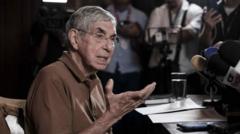During a press conference in San José, Arias expressed his confusion over the decision, noting that he believed the State Department, rather than Trump, was responsible for the revocation. He also hinted that the cancellation might relate to his diplomatic shift towards China when he served as president from 2006 to 2010, specifically the establishment of formal relations with Beijing over Taiwan in 2007.
This diplomatic pivot aligns with the Trump administration's broader strategy to counter Chinese influence in Latin America, exemplified by their disapproval of several Central American governments that appear to strengthen ties with Beijing. Arias has been a vocal critic of the current Costa Rican administration under President Rodrigo Chaves, particularly slamming his decision to exclude Chinese companies from the country's 5G development, which he claims reflects a problematic alignment with US interests.
Notably, Arias is not the only political figure in Costa Rica to face visa cancellation; three members of the national assembly, who also opposed the Chaves administration's stance on Chinese involvement, have experienced similar fates. This pattern raises concerns about the implications of US visa policies in the context of diplomatic dissent and the broader geopolitical landscape in Central America.
As the world watches Costa Rica navigate these turbulent waters, Arias' case may highlight the influence of US foreign policy on small nations and the ramifications for leaders who dare to challenge the status quo.
This diplomatic pivot aligns with the Trump administration's broader strategy to counter Chinese influence in Latin America, exemplified by their disapproval of several Central American governments that appear to strengthen ties with Beijing. Arias has been a vocal critic of the current Costa Rican administration under President Rodrigo Chaves, particularly slamming his decision to exclude Chinese companies from the country's 5G development, which he claims reflects a problematic alignment with US interests.
Notably, Arias is not the only political figure in Costa Rica to face visa cancellation; three members of the national assembly, who also opposed the Chaves administration's stance on Chinese involvement, have experienced similar fates. This pattern raises concerns about the implications of US visa policies in the context of diplomatic dissent and the broader geopolitical landscape in Central America.
As the world watches Costa Rica navigate these turbulent waters, Arias' case may highlight the influence of US foreign policy on small nations and the ramifications for leaders who dare to challenge the status quo.




















